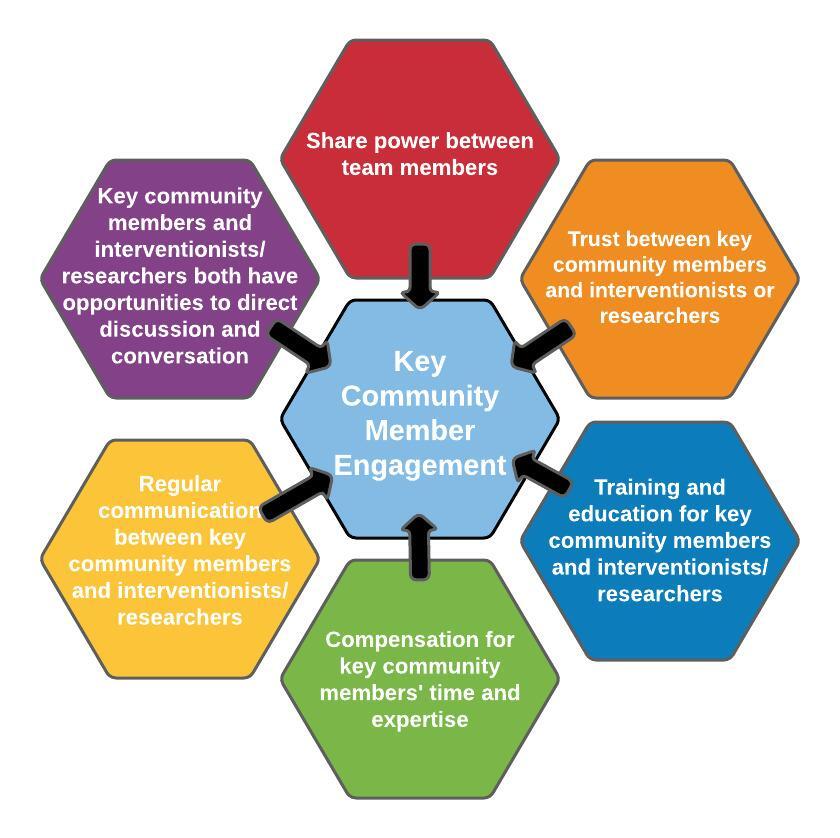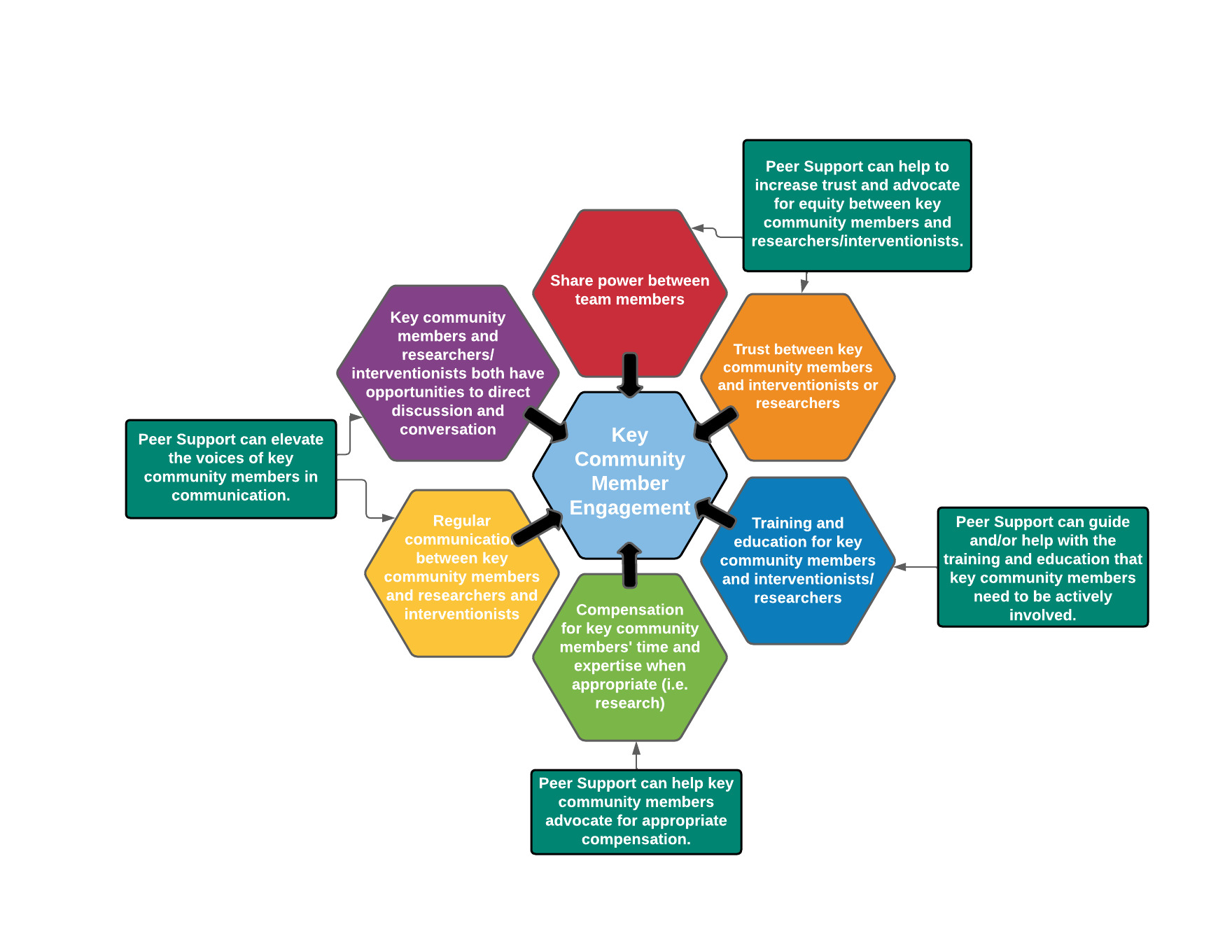Research Engagement and Peer Support
Key community members are people or organizations that either have an interest or are affected by the results of the research. There are many demonstrated benefits to stakeholder [key community member] engagement in research (Domecq et al., 2014; Dudley et al., 2015; Harrison et al., 2019; Sheridan, Schrandt, Forsythe, Hilliard & Paez, 2017; Walmsely, Strnadova, & Johnson, 2018). Some of these benefits include:
- Research that is meaningful and important to the people that it is meant to help
- A greater acceptance of the results
- An increase in interest in participating in the research
- Key community member empowerment during the research process
- The ability to influence the direction of research so that it is important to that group of people
- Making sure that study materials and methods are appropriate and accessible
There several key components to successful engagement with key community members (Bigby et al., 2014; Frankena et al., 2019; Harrison et al., 2019; Nind & Vinha, 2014). These include:

Peer support is a reciprocal, nonhierarchical relationship where a person with lived experience provides guidance to someone else with that shared personal experience. This mutual exchange of help is based on shared understanding, respect, and empowerment.
Peer support can be used to support successful engagement with key community members.

Resources on Key Community Members Engagement
There are a number of helpful resources that provide information on how to engage people with IDD and their families or caregivers in research. Although these resources do not use peer support for engagement, they provide an overview of methods and strategies engaging key key community member in research.
- Resources on Key Community Members Engagement
- FYREworks Research Training: Partnership-based research training for family, youth and researcher education.
- Health Research Engagement Toolkit: A Toolkit for making research more inclusive to people with IDD; includes the READI (Research Engagement & Advocacy for Diverse Individuals) Curriculum, an accessible way to to learn about health research and how to get involved.
- Tools for Stakeholder Engagement in Research: Provides a variety of tools and resources to support stakeholder engagement in the research process across a broad range of research projects.
- Toolkit for Remote Inclusive Research: A toolkit of information and resources to help people with intellectual and developmental disabilities (IDD) engage and be part of research during public health emergencies.
- Research Fundamentals: Preparing You to Successfully Contribute to Research: On-line training modules that provide ways to learn about the research process for health outcomes research.
- Academic Autism Spectrum Partnership in Research and Education (AAPSIRE): Brings together the academic community and the autistic community to conduct research projects relevant to the needs of adults on the autism spectrum. The partnership adheres to the principles of Community Based Participatory Research (CBPR), whereby academics and community members serve as equal partners throughout the research process.
- Inclusive Research Network: A group of people with an intellectual disability who come together to do research on ideas and issues that matter to them. The website includes reports and publications.
References
Bigby, C., Frawley, P., & Ramcharan, P. (2014). Conceptualizing inclusive research with people with intellectual disability. Journal of Applied Research in Intellectual Disabilities, 27(1), 3-12.
Domecq, J. P., Prutsky, G., Elraiyah, T., et al. (2014) Patient engagement in research: A systematic review. BMC Health Services Research, 14, 89. http://doi.org/10.1186/1472-6963-14-89.
Dudley, L., Gamble, C., Preston, J. et al. (2015). What difference does patient and public involvement make and what are its pathways to impact? Qualitative study of patients and researchers from a cohort of randomised clinical trials. PLoS ONE, 10(6), e0128817.
Frankena, T. K., Naaldenberg, J., Cardol, M., Garcia Iriarte, E., Buchner, T., Brooker, K., ... & Leusink, G. (2019). A consensus statement on how to conduct inclusive health research. Journal of Intellectual Disability Research, 63(1), 1-11.
Harrison, J. D., Auerbach, A. D., Anderson, W., Fagan, M., Carnie, M. Hanson, C., Banta, J. Symczak, G., Robinson, E. Schnipper, J., Wong, C, & Weiss, R. (2019). Patient stakeholder engagement in research: A narrative review to describe foundational principle and best practice activities. Health Expectations, 22, 307-316.
Nind, M., & Vinha, H. (2014). Doing research inclusively: bridges to multiple possibilities in inclusive research. British Journal of Learning Disabilities, 42(2), 102-109.
Sheridan, S., Schrandt, S., Forsythe, L., Hilliard, T. S., Paez, K. A. (2017). The PCORI engagement rubric: Promising practices for partnering in research. Annals of Family Medicine, 15(2), 165–70.
Walmsley, J., Strnadová, I., & Johnson, K. (2018). The added value of inclusive research. Journal of Applied Research in Intellectual Disabilities, 31(5), 751-759.